Find Help
More Items From Ergsy search
-
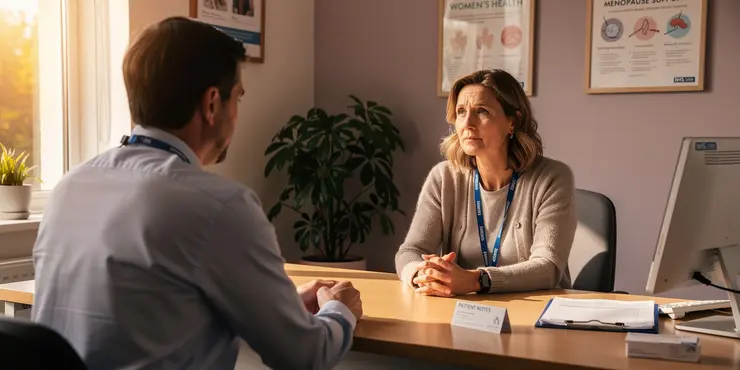
Talking menopause with your GP
Relevance: 100%
-
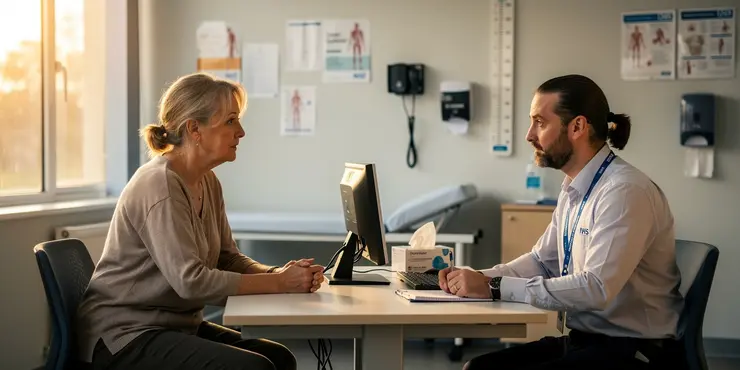
Talking menopause with your GP
Relevance: 100%
-
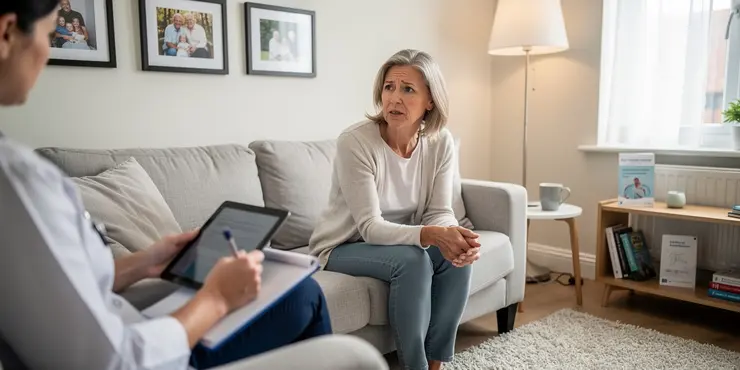
Living with the menopause
Relevance: 63%
-
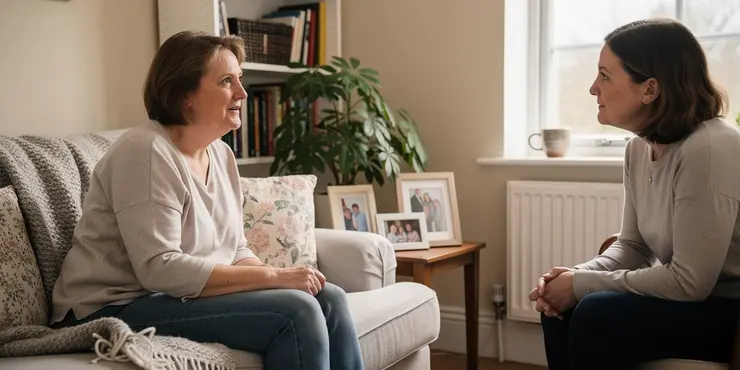
Living with the menopause
Relevance: 59%
-
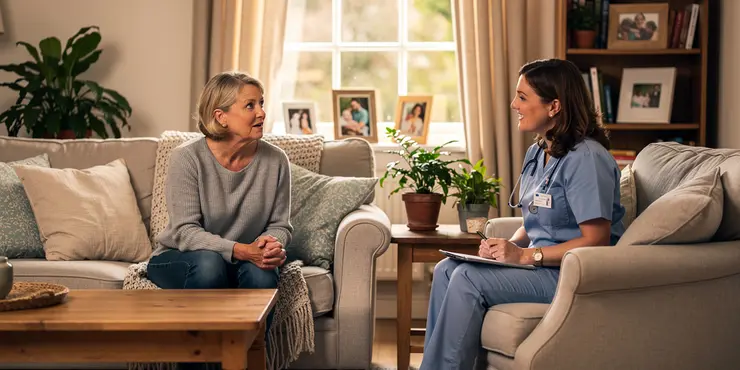
What is menopause?
Relevance: 56%
-
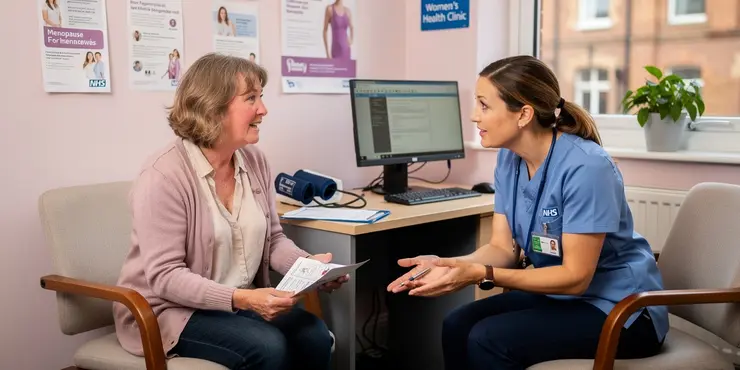
Menopause Myths
Relevance: 56%
-
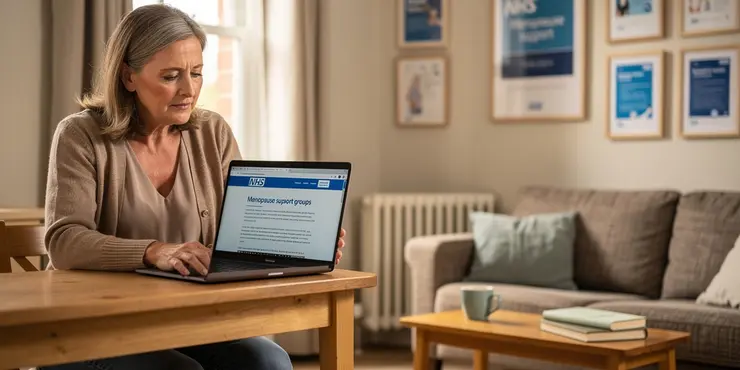
How can I find NHS-recommended menopause support groups online?
Relevance: 56%
-
What is menopause masking?
Relevance: 54%
-
What is menopause masking?
Relevance: 54%
-
What is the difference between perimenopause and menopause?
Relevance: 54%
-
What treatments are available for menopause masking?
Relevance: 53%
-
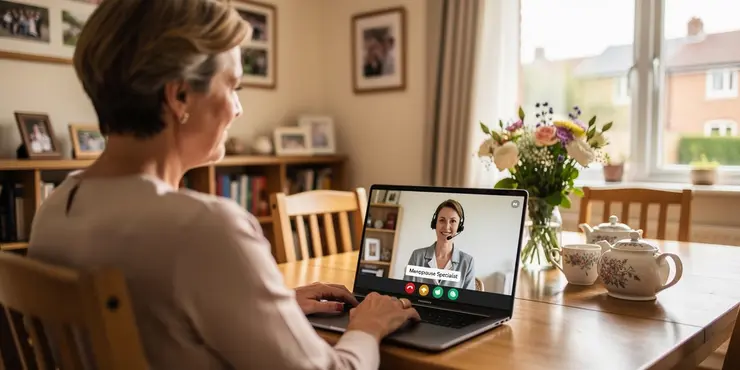
Can I consult with a specialist about menopause online through the NHS?
Relevance: 53%
-
Can menopause affect bone health?
Relevance: 52%
-
Is it possible to delay menopause naturally?
Relevance: 52%
-
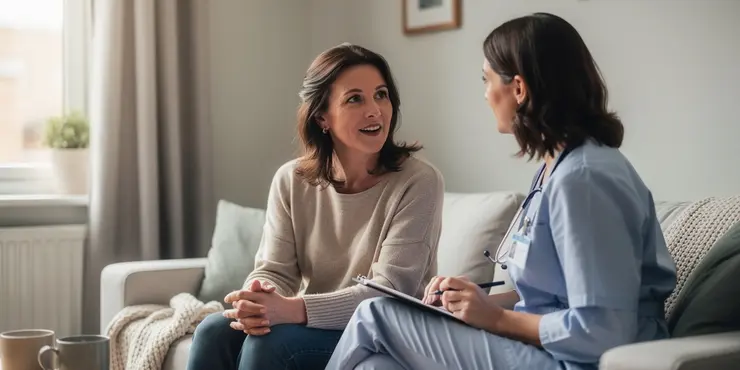
Does the NHS offer an online hospital for menopause?
Relevance: 52%
-
What is the role of estrogen in menopause?
Relevance: 51%
-
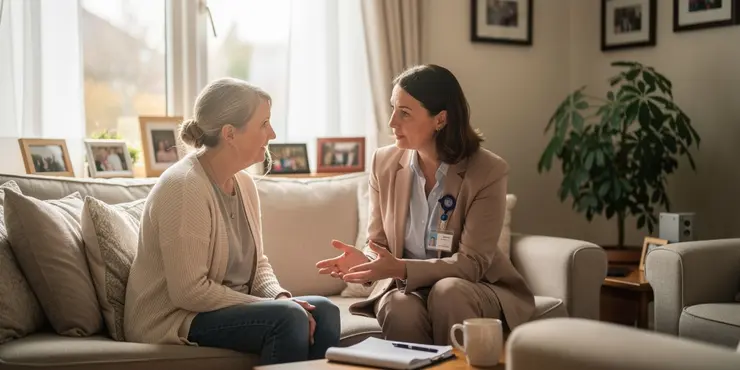
Does the NHS offer an online hospital for menopause?
Relevance: 51%
-
What are common symptoms of menopause?
Relevance: 51%
-
Are there natural remedies for menopause masking?
Relevance: 51%
-
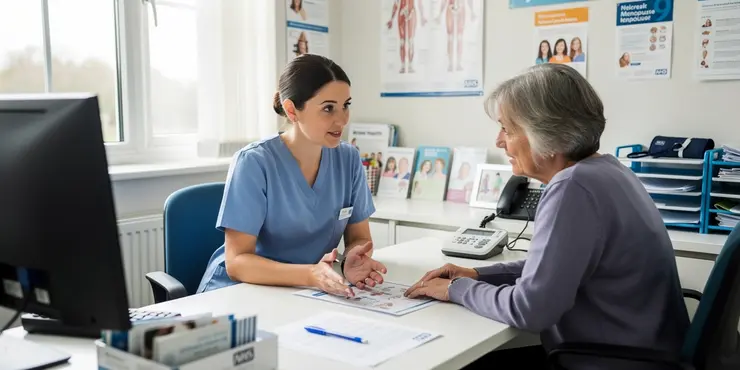
Are there any NHS apps for managing menopause symptoms?
Relevance: 51%
-
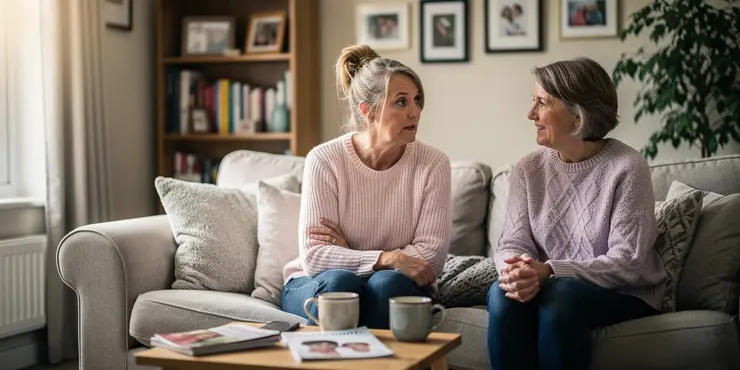
Does Menopause Only Happen in Your 50's? | NHS 24
Relevance: 51%
-
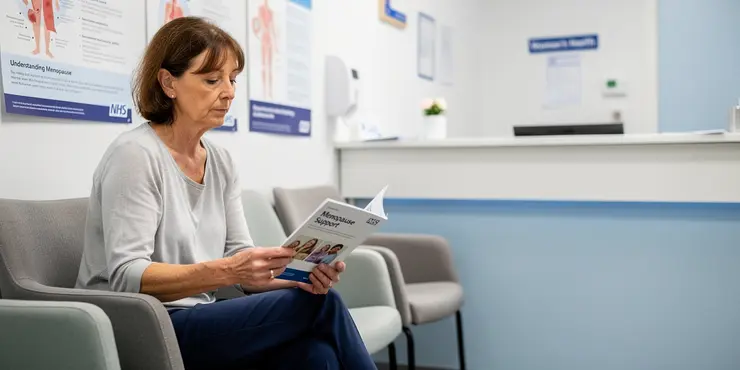
Does the menopause just happen suddenly?
Relevance: 51%
-
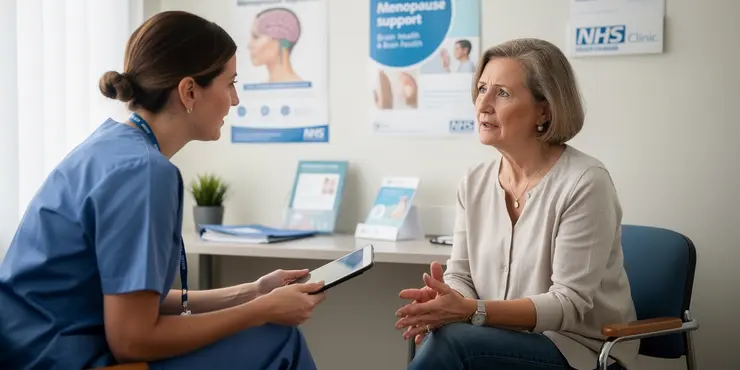
Is menopause linked to loss of brain matter?
Relevance: 50%
-
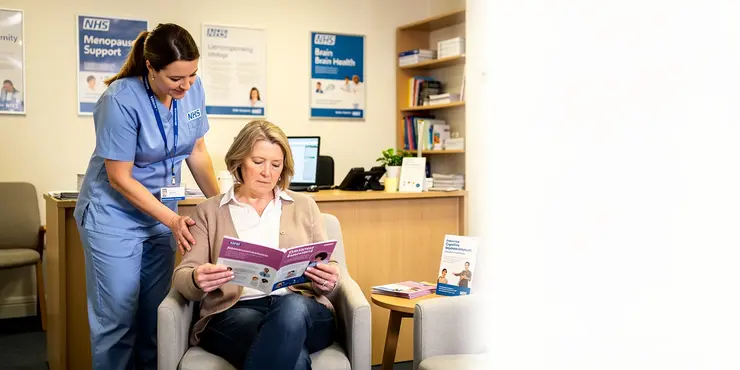
Is there scientific evidence linking menopause to dementia?
Relevance: 50%
-
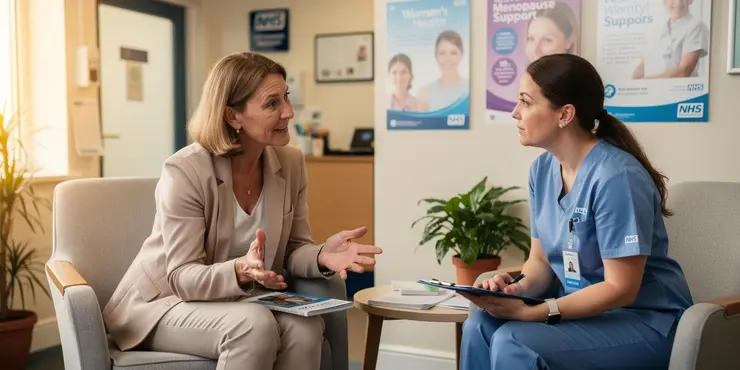
What are the links between menopause and dementia?
Relevance: 50%
-
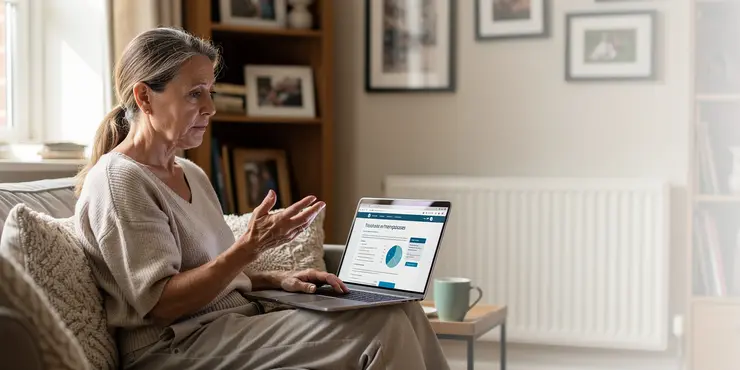
Does the NHS have an online symptom checker for menopause?
Relevance: 50%
-
Are there specific types of dementia linked to menopause?
Relevance: 50%
-
Is hormone replacement therapy safe for menopause masking?
Relevance: 49%
-
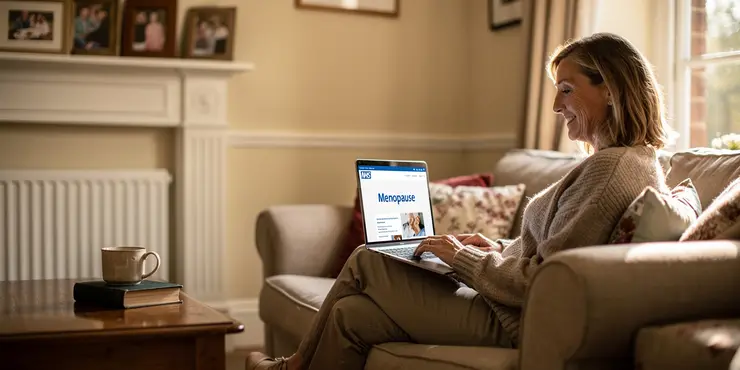
What online resources does the NHS offer for menopause?
Relevance: 49%
-
Can acupuncture help with menopause masking?
Relevance: 49%
-
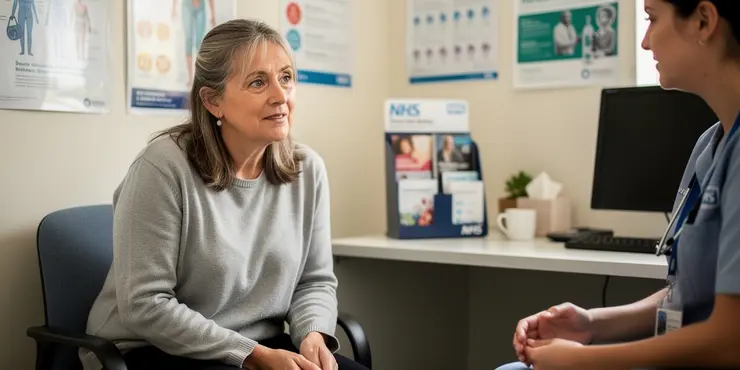
How long does menopause usually go on?
Relevance: 49%
-
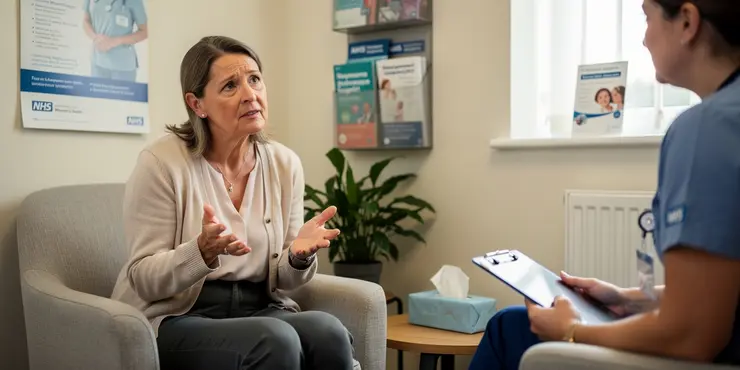
Is the age of menopause onset related to dementia risk?
Relevance: 49%
-
What psychological effects can menopause have?
Relevance: 48%
-
How does exercise impact menopause masking?
Relevance: 48%
-
Can stress management aid in menopause masking?
Relevance: 48%
-
Can lifestyle changes help with menopause masking?
Relevance: 48%
-
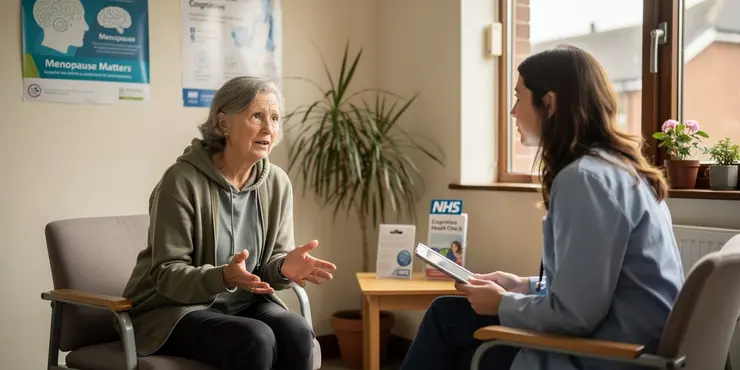
Are there psychological impacts of menopause that affect cognitive health?
Relevance: 48%
-
How does sleep quality relate to menopause symptoms?
Relevance: 47%
-
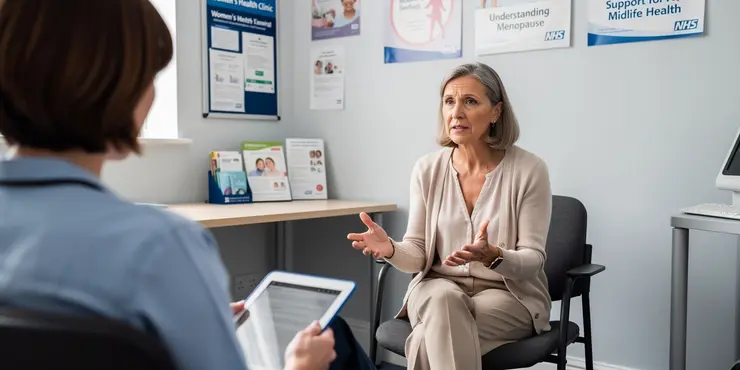
What further research is needed about menopause and dementia?
Relevance: 47%
-
Why do some women use menopause masking?
Relevance: 47%
Talking Menopause with Your GP
Understanding Menopause
Menopause is a natural biological process marking the end of a woman's reproductive years, typically occurring between 45 and 55 years of age. It is characterized by symptoms such as hot flashes, night sweats, mood swings, and changes in menstrual cycles. Understanding these symptoms is vital for discussing your condition with your GP effectively.
Preparing for Your Appointment
Preparation is key for getting the most out of your GP appointment. Keep a diary of your symptoms, noting their frequency and severity. List your questions and concerns in advance, so you’re less likely to forget important points during the discussion. Bringing information about your family medical history can also help your GP provide more personalized advice.
Discussion Points
When talking to your GP, discuss both physical and emotional symptoms. Clarify any periods of intense discomfort you’ve experienced and ask about potential treatments. It’s important to inquire about both hormone replacement therapy (HRT) and non-HRT options, including lifestyle changes, to manage your symptoms effectively.
Questions to Ask
Consider asking your GP questions such as:
- What are the risks and benefits of HRT?
- Are there non-hormonal treatments available?
- How can I manage menopause symptoms through diet and exercise?
- What resources are available for emotional support?
Follow-up and Support
After your initial appointment, schedule follow-up visits to monitor your progress and adjust treatment plans as needed. Utilize support groups and resources provided by organisations such as the British Menopause Society and the NHS. Sharing experiences with others going through similar situations can be incredibly comforting and informative.
Conclusion
Effective communication with your GP is crucial for managing menopause symptoms and improving your quality of life. By preparing in advance, discussing all aspects of your symptoms, and exploring various treatment options, you can navigate this life stage with greater confidence and support. Remember, you are not alone, and help is available.
Talking Menopause with Your GP
What is Menopause?
Menopause is when a woman's body changes and she can no longer have children. This usually happens between the ages of 45 and 55. It can cause things like feeling very hot, sweating at night, feeling moody, and having changes in your period. Knowing about these changes is important when talking to your GP.
Getting Ready for Your Doctor Visit
Before you see your GP, it's good to get ready. Write down how you feel each day, like when you feel hot or moody. Make a list of questions you want to ask. Also, tell the doctor about any illnesses in your family. This helps your doctor give you better advice.
Things to Talk About
When you speak to your GP, tell them about how you feel in your body and in your mind. Explain if you have times when you feel really bad. Ask about ways to feel better. There are treatments with medicine, called HRT, and other ways like eating well and exercise.
Questions to Ask Your Doctor
Here are some questions you can ask your GP:
- What are the good and bad things about HRT?
- Are there treatments without hormones?
- How can I feel better with food and exercise?
- Where can I find help for feeling sad or worried?
Check-ups and Help
After seeing your GP, have more check-ups to see how you are doing. You can find help from groups like the British Menopause Society and the NHS. Talking to other people who understand can make you feel better.
Conclusion
Talking to your GP helps you feel better during menopause. By being ready, talking about how you feel, and learning about different treatments, you can feel more sure of yourself. Remember, you are not alone, and there is help for you.
Frequently Asked Questions
What is menopause?
Menopause is a natural biological process that marks the end of a woman's menstrual cycles. It is diagnosed after 12 months without a menstrual period and typically occurs in women in their late 40s to early 50s.
What are common symptoms of menopause?
Common symptoms include hot flushes, night sweats, sleep disturbances, mood swings, weight gain, and vaginal dryness. These can vary in intensity and duration.
When should I see my GP about menopause?
You should see your GP if you experience severe symptoms that affect your daily life, or if you have concerns about irregular menstrual bleeding or other health issues.
What treatments are available for menopause symptoms?
Treatments include hormone replacement therapy (HRT), lifestyle changes, and non-hormonal medications. Your GP can help determine which option is best for you.
What is hormone replacement therapy (HRT)?
HRT involves taking medications that contain female hormones to replace the ones your body no longer makes after menopause. It can help relieve symptoms like hot flushes and prevent bone loss.
Are there risks associated with HRT?
HRT may increase the risk of certain conditions such as breast cancer, blood clots, and stroke. However, the benefits often outweigh the risks for many women. Discuss with your GP to make an informed decision.
Can lifestyle changes help manage menopause symptoms?
Yes, healthy eating, regular exercise, maintaining a healthy weight, and avoiding triggers like caffeine and alcohol can help manage symptoms.
Are there any natural remedies for menopause symptoms?
Some women find relief with natural remedies like phytoestrogens, black cohosh, and evening primrose oil, but their efficacy varies and they are not regulated like prescription medications. Discuss any supplements with your GP.
How long do menopause symptoms last?
Symptoms can last for several years, typically around 4 to 7 years, but some women may experience them for a shorter or longer period.
How does menopause affect bone health?
Estrogen helps maintain bone density. When estrogen levels drop during menopause, women are at a higher risk for osteoporosis. Weight-bearing exercises, calcium, and vitamin D supplements can help maintain bone health.
Can menopause affect my mental health?
Yes, menopause can affect mental health, leading to symptoms such as anxiety, depression, and mood swings. If you are struggling, talk to your GP about support and treatment options.
What should I know about postmenopausal bleeding?
Any bleeding after menopause should be investigated by your GP, as it can be a sign of a more serious condition such as endometrial cancer.
Can I still get pregnant during menopause?
While fertility decreases, it is still possible to become pregnant during perimenopause. Continue using contraception until you have gone 12 months without a period if you do not want to become pregnant.
How does menopause affect cardiovascular health?
The decline in estrogen levels can increase the risk of cardiovascular problems. Maintaining a healthy lifestyle and regular check-ups with your GP are important.
Can my GP refer me to a specialist for menopause care?
Yes, if needed, your GP can refer you to a specialist, such as a gynaecologist or an endocrinologist, for further evaluation and management of menopause symptoms.
What is menopause?
Menopause is something that happens to women. It means their bodies change and they stop having periods. Periods are the times each month when women may bleed.
Menopause usually happens to women between 45 and 55 years old.
If you want to know more, you can ask a doctor or nurse. There are also books and websites that can help explain it clearly.
Menopause is when a woman's periods stop. It is a normal part of getting older. A doctor will say a woman is in menopause if she has not had a period for 12 months. This usually happens to women in their late 40s to early 50s.
What are common signs of menopause?
Menopause is when a woman stops having periods. Here are some signs that menopause might be starting:
1. Hot Flashes: You might feel very hot suddenly.
2. Night Sweats: You sweat a lot when you are sleeping.
3. Mood Changes: Sometimes you might feel sad or grumpy.
4. Trouble Sleeping: It might be hard to fall asleep or stay asleep.
5. Forgetfulness: You might find it hard to remember things.
Tools to help:
- Talk to a doctor: They can give you advice.
- Keep a fan nearby: It can help if you feel hot.
- Relaxation apps: These can help you sleep better.
Here are some common signs that a person might notice:
- Feeling hot suddenly, called hot flushes
- Sweating a lot at night
- Having trouble sleeping
- Feeling happy or sad quickly, called mood swings
- Gaining weight
- Feeling dry in the private parts
These signs can be different for everyone. Some people might have them a lot, and others might only notice them a little bit.
If you find these signs difficult, you can:
- Talk to a doctor for help
- Write down what you feel in a diary
- Use a fan or wear light clothes to stay cool
- Try to relax before bedtime to sleep better
When should I see my doctor about menopause?
You can see your doctor if you think you have signs of menopause. Signs can be hot flushes or your periods stopping. Talking to a doctor can help you feel better. They may suggest treatments or ways to make the signs easier.
If you are worried or feel unwell, it's a good idea to visit your doctor. You can write down your questions. You can also bring a friend or family member for support.
There are things that can help, like keeping a diary of how you feel. You can also use pictures or apps to track your signs.
Go to your doctor if you have strong pain that makes life hard. Also, see your doctor if your periods are not regular, or if you are worried about other health problems.
What can help with menopause symptoms?
Menopause is when a woman's body changes and stops having periods. Some people have symptoms like feeling hot or moody.
Here are some things that can help:
- Talk to a Doctor: A doctor can give advice and treatment.
- Medicines: Some medicines can help with hot feelings and mood changes.
- Exercise: Moving your body can help you feel better.
- Healthy Eating: Eating good food can make you feel strong.
- Relaxation: Doing things that help you relax, like deep breathing.
Using simple tools like picture charts or audiobooks can also help you understand more.
Treatments can include hormone replacement therapy (HRT), changing the way you live, and taking non-hormonal medicine. Your doctor can help you find the best choice for you.
What is hormone replacement therapy (HRT)?
Hormone replacement therapy, or HRT, is a way to help people feel better. It gives your body hormones that it might not make enough of on its own.
HRT can help with things like hot flashes and feeling tired. Doctors sometimes give HRT to people who are going through menopause.
If you have questions about HRT, talk to a doctor or nurse. You can also ask someone you trust to help you understand. A friend or family member can come with you to doctor visits.
HRT is when you take medicine with female hormones. Your body stops making these hormones after menopause. HRT can help with hot flashes and keep your bones strong.
Is HRT safe?
HRT can sometimes make the chance of getting some illnesses like breast cancer, blood clots, and stroke higher. But, it can also have good things that help many women. Talk with your doctor to decide what is best for you.
Can changing how you live help with menopause?
Menopause is when a woman's body changes as she gets older. It can have some symptoms that might make you feel uncomfortable. Here are some simple ways that might help:
- Eat healthy food: Try to eat fruits, vegetables, and whole grains. They can help you feel good and stay strong.
- Exercise regularly: Going for walks or doing simple exercises can help with mood and energy.
- Sleep well: Try to go to bed at the same time every night and relax before bedtime.
- Stay cool: Wear light clothes and keep your room cool to help with hot flashes.
- Talk to someone: Share how you feel with friends or family. It can help a lot!
If you want more help, you can talk to a doctor. They can give you more ideas on how to feel better.
Yes, eating healthy foods, doing exercise, staying at a good weight, and staying away from things like caffeine and alcohol can help you feel better.
Can nature help with menopause symptoms?
Menopause is when you stop having periods. It can cause hot flashes, mood changes, and trouble sleeping.
Some people use natural ways to feel better:
- Drink herbal teas, like chamomile or peppermint.
- Eat healthy foods like fruits, vegetables, and whole grains.
- Exercise regularly, like walking or gentle yoga.
- Try deep breathing or relaxation exercises.
It’s a good idea to talk to a doctor before trying new remedies.
Special tools like picture cards or apps can help you learn more about menopause.
Some women feel better using natural remedies. These include plants and oils like phytoestrogens, black cohosh, and evening primrose oil. These might work differently for each person. They are not checked like medicines from the doctor. Always talk to your doctor before trying new supplements.
How long do menopause symptoms last?
Menopause is when a woman's body changes and stops having periods. It happens as women get older.
Women can feel different things during menopause. These feelings are called symptoms. Some women might feel hot, tired, or sad.
These menopause symptoms can last for some time. They can last for a few months or even a few years. Every woman is different.
If you want to feel better during menopause, you can try:
- Talking to a doctor: They can give advice.
- Staying cool: Wearing light clothes can help.
- Relaxing: Deep breaths and quiet time can make you feel better.
- Exercise: Moving your body can help with stress and mood.
Signs can last a long time. Usually, they last between 4 to 7 years. But for some women, they might go away sooner. For others, they might last longer.
How does menopause affect bone health?
Menopause is the time when a woman's body changes and she stops having periods. This can happen when women are around 45 to 55 years old. During menopause, bones can become weak and break easily. This is because the body makes less of a hormone called estrogen, which helps keep bones strong.
Here are some tips that can help keep bones healthy:
- Eat foods with calcium and vitamin D, like milk, cheese, or yogurt.
- Spend some time in the sunshine for vitamin D.
- Exercise or play to make bones hard and strong, like running or jumping.
- Ask the doctor if you need to take any special medicine to help your bones.
Estrogen helps keep bones strong. During menopause, estrogen levels go down. This makes it easier for women's bones to become weak. Doing exercises like walking or lifting weights, and taking calcium and vitamin D, can help keep bones healthy.
Can menopause change how I feel?
Yes, menopause can make you feel different. It can make you feel worried, sad, or change how you feel quickly. If you are having a hard time, talk to your doctor. They can help you feel better.
What do I need to know about bleeding after menopause?
If you have any bleeding after menopause, go to your doctor. It might be something serious, like a type of cancer called endometrial cancer.
Can I have a baby while going through menopause?
Menopause is when a woman's body changes and her periods stop. But sometimes, a woman can still get pregnant during this time. If you don't want to have a baby, it’s good to use protection.
Talking to a doctor can help you understand more. They can answer your questions and give advice. Using calendars and apps can also help track your body's changes.
Even though it gets harder to have a baby, you can still get pregnant during the time before menopause called perimenopause. If you don't want to have a baby, keep using birth control until you have had no periods for 12 months in a row.
You might find it helpful to talk with a doctor about the best birth control for you. You can also use tools like reminders or phone apps to help you track your periods. This can make it easier to know if you need to keep using birth control.
How does menopause change heart health?
Menopause is when a woman's body stops having periods. After menopause, some changes can happen in the body. These changes can sometimes affect the heart and how it works. It's a good idea to talk to a doctor about staying healthy. Some tools can help: - **Eating Healthy Food**: Eating fruits and vegetables can help keep the heart strong. - **Exercise**: Moving more, like walking or playing, is good for the heart. - **Regular Check-Ups**: Doctors can help by checking the heart and body regularly. - **Support**: Friends and family can help you to stay healthy and feel good. Talking about these things can help people understand how menopause affects the heart.When your body has less estrogen, your heart might not stay as healthy. It's important to eat good food, exercise, and visit your doctor often to stay healthy.
Can my doctor help me see a menopause expert?
If you need more help, your doctor can send you to see another doctor. This could be a doctor who knows a lot about women’s health or a doctor who knows about hormones. They can help you with menopause symptoms.
Useful Links
This website offers general information and is not a substitute for professional advice.
Always seek guidance from qualified professionals.
If you have any medical concerns or need urgent help, contact a healthcare professional or emergency services immediately.
Some of this content was generated with AI assistance. We’ve done our best to keep it accurate, helpful, and human-friendly.
- Ergsy carfully checks the information in the videos we provide here.
- Videos shown by Youtube after a video has completed, have NOT been reviewed by ERGSY.
- To view, click the arrow in centre of video.
- Most of the videos you find here will have subtitles and/or closed captions available.
- You may need to turn these on, and choose your preferred language.
- Go to the video you'd like to watch.
- If closed captions (CC) are available, settings will be visible on the bottom right of the video player.
- To turn on Captions, click settings .
- To turn off Captions, click settings again.
More Items From Ergsy search
-

Talking menopause with your GP
Relevance: 100%
-

Talking menopause with your GP
Relevance: 100%
-

Living with the menopause
Relevance: 63%
-

Living with the menopause
Relevance: 59%
-

What is menopause?
Relevance: 56%
-

Menopause Myths
Relevance: 56%
-

How can I find NHS-recommended menopause support groups online?
Relevance: 56%
-
What is menopause masking?
Relevance: 54%
-
What is menopause masking?
Relevance: 54%
-
What is the difference between perimenopause and menopause?
Relevance: 54%
-
What treatments are available for menopause masking?
Relevance: 53%
-

Can I consult with a specialist about menopause online through the NHS?
Relevance: 53%
-
Can menopause affect bone health?
Relevance: 52%
-
Is it possible to delay menopause naturally?
Relevance: 52%
-

Does the NHS offer an online hospital for menopause?
Relevance: 52%
-
What is the role of estrogen in menopause?
Relevance: 51%
-

Does the NHS offer an online hospital for menopause?
Relevance: 51%
-
What are common symptoms of menopause?
Relevance: 51%
-
Are there natural remedies for menopause masking?
Relevance: 51%
-

Are there any NHS apps for managing menopause symptoms?
Relevance: 51%
-

Does Menopause Only Happen in Your 50's? | NHS 24
Relevance: 51%
-

Does the menopause just happen suddenly?
Relevance: 51%
-

Is menopause linked to loss of brain matter?
Relevance: 50%
-

Is there scientific evidence linking menopause to dementia?
Relevance: 50%
-

What are the links between menopause and dementia?
Relevance: 50%
-

Does the NHS have an online symptom checker for menopause?
Relevance: 50%
-
Are there specific types of dementia linked to menopause?
Relevance: 50%
-
Is hormone replacement therapy safe for menopause masking?
Relevance: 49%
-

What online resources does the NHS offer for menopause?
Relevance: 49%
-
Can acupuncture help with menopause masking?
Relevance: 49%
-

How long does menopause usually go on?
Relevance: 49%
-

Is the age of menopause onset related to dementia risk?
Relevance: 49%
-
What psychological effects can menopause have?
Relevance: 48%
-
How does exercise impact menopause masking?
Relevance: 48%
-
Can stress management aid in menopause masking?
Relevance: 48%
-
Can lifestyle changes help with menopause masking?
Relevance: 48%
-

Are there psychological impacts of menopause that affect cognitive health?
Relevance: 48%
-
How does sleep quality relate to menopause symptoms?
Relevance: 47%
-

What further research is needed about menopause and dementia?
Relevance: 47%
-
Why do some women use menopause masking?
Relevance: 47%


